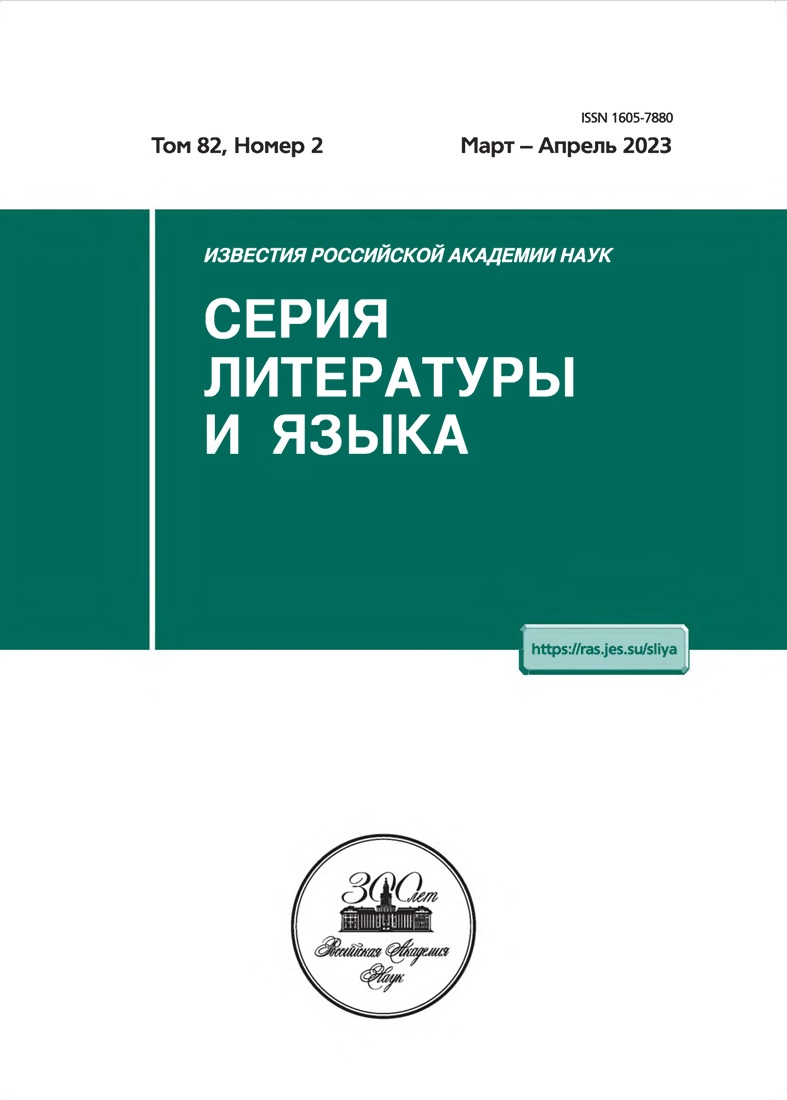On Emotionally Colored Speech of Internet Users
- Authors: Potapova R.K.1, Potapov V.V.2
-
Affiliations:
- Moscow State Linguistic University
- Lomonosov Moscow State University
- Issue: Vol 82, No 2 (2023)
- Pages: 52-62
- Section: Articles
- URL: https://rjonco.com/1605-7880/article/view/656975
- DOI: https://doi.org/10.31857/S160578800025501-7
- ID: 656975
Cite item
Abstract
The switch from the traditional epistolary style of information exchange between people to the ultra-high-speed Internet communication had a great impact not only on the intellectual component of the communicants, but primarily on the formation of the emotional state of the latter, as well as the formation of the cognitive-emotional perception of the world around. This factor was of particular importance not only for the formation of the psyche of young communicants, but also for changing the holistic picture of the world, where the emotional and modal components of communication play an important role for the formation of the personalities of the representatives of the modern young generation.
About the authors
Rodmonga Kondrat'evna Potapova
Moscow State Linguistic UniversityRussian Federation, Moscow
Vsevolod Viktorovich Potapov
Lomonosov Moscow State UniversityRussian Federation, Moscow
References
- Буш Г. Диалогика и творчество. Рига: Авотс, 1985. 318 с.
- Digital Humanities: Eine Einführung / F. Jannidis, H. Kohle, M. Rehbein (Hg.). Stuttgart: J.B. Metzler Verlag, 2017. 370 S.
- Потапова Р.К., Потапов В.В., Лебедева Н.Н., Агибалова Т.В. Поликодовая среда Интернета и проблемы валеологии. М.: Издательский Дом ЯСК, 2020. 136 с.
- Виральность. Механики и метрики. URL: http://community.sk.ru/news/reading/b/advisorblog/archive/2013/03/10/mehanizmyvarialnosti.aspx
- Panksepp J. Posterior pituitary hormones and separation distress in chicks // Neuroscience. Abstracts. 1988. No. 14. P. 287.
- Пэйн Р.Л., Купер К.Л. Эмоции и работа. Теории исследования и методы применения / Пер. с англ. Харьков: Гуманитарный центр, 2008. 544 с.
- Потапова Р.К., Потапов В.В. Основы многоаспектного исследования “электронной личности” по голосу и речи в информационно-коммуникационной среде Интернета // Человек: Образ и сущность. ИНИОН РАН. 2017. № 1–2. С. 87–111.
- Потапова Р.К. О комбинаторно-конверсивной природе конфликтогена // Язык в глобальном контексте: языковые контакты и языковые конфликты в современном мире: Сб. науч. трудов / Отв. ред. В.В. Потапов, Е.А. Казак. М.: ИНИОН РАН, 2021. С. 5–16.
- Психология мотивации и эмоций / Под ред. Ю.Б. Гиппенрейтер, М.В. Фаликман. - М.: ЧeРо; Московский психолого-социальный институт, 2002. 752 с.
- Jaspers K. Allgemeine Psychopathologie. 8., korr. Aufl. Springer, 1973. 764 S.
- Брокгауз. Философия: концепции, мыслители, понятия / Пер. с нем. СПб: Амфора. ТИД Амфора: РХГА, 2010. 423 с.
- Fiehler R. Kommunikation und Emotion. Berlin, New York: Walter de Gruyter, 1990. 338 S.
- Watson D., Tellegen A. Toward a consensual structure of mood // Psychological Bulletin. 1985. 98. P. 219–235.
- Minsky M. A framework for representation knowledge. Cambridge: Massachusetts Institute of Technology, 1974. 76 p.
- Goffman E. Frame analysis: an essay on the organization of experience. Boston (Mass.): Northeastern University Press; 1986. 586 p.
- Вахштейн В.С. Социология повседневности и теория фреймов. СПб.: Изд-во Европейского ун-та, 2011. 334 с.
- Сарна А. Интертекстуальный анализ // Новые медиа: социальная теория и методология исследований / Отв. ред. О.В. Сергеева, О.В. Терещенко. СПб.: Алетейя, 2017. С. 87–89.
- Die Psychologie des Postfaktischen: Über Fake News, “Lügenpresseˮ, Clickbait & Co. Berlin; Heidelberg: Springer Verlag, 2020. 224 S.
- Appel M. Die Psychologie des Postfaktischen-Einleitung und Überblick // Die Psychologie des Postfaktischen: Über Fake News, “Lügenpresseˮ, Clickbait & Co. Berlin; Heidelberg: Springer Verlag, 2020. S. 1–7.
- Ожегов С.И. Словарь русского языка. Изд. 17-е. М.: Русский язык, 1985. 797 с.
- Современный толковый словарь русского языка / Гл. ред. С.А. Кузнецов. М.: Ридерз Дайджест, 2004. 960 с.
- Rieger D., Dippold J., Appel M. Trolle gibt es nicht nur in Märchen – das Phänomen Trolling im Internet // Die Psychologie des Postfaktischen: Über Fake News, “Lügenpresseˮ, Clickbait & Co. Berlin; Heidelberg: Springer Verlag, 2020. S. 45–58.
- Потапов В.В., Маслова Н.Е. О структурном моделировании провокационно-эвокационных словоформ русскоязычного сегмента Интернета // Язык в глобальном контексте: языковые контакты и языковые конфликты в современном мире: Сб. науч. трудов / Отв. ред. В.В. Потапов, Е.А. Казак. М.: ИНИОН РАН, 2021. С. 50–61.
- Jakobson R. Verbal communication // Scientific American. 1972. Vol. 227. № 3. P. 73–80.
- Потапова Р.К., Потапов В.В., Лебедева Н.Н., Агибалова Т.В. Междисциплинарность в исследовании речевой полиинформативности. М.: Издательский Дом ЯСК, 2015. 352 с.
- Потапова Р.К. Речь: Коммуникация, информация, кибернетика. Изд. 4, доп. М., Книжный дом “Либрокомˮ, 2010. 600 с.
- Потапова Р.К., Потапов В.В. Язык, речь, личность. М.: Языки славянской культуры, 2006. 496 с.
- Potapova R.K., Potapov V.V. Kommunikative Sprechtätigkeit: Rußland und Deutschland im Vergleich. Köln, Weimar, Wien: Böhlau Verlag, 2011. 320 S.
- Потапова Р.К., Потапов В.В. Речевая коммуникация: От звука к высказыванию. М.: Языки славянских культур, 2012. 464 с.
- Potapova R. From Deprivation to aggression: verbal and non-verbal social network communication // International Conference “Global Science and Innovation”. USA, Chicago, November 18–19th, 2015. P.129–137.
Supplementary files










